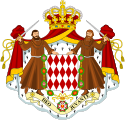 |
|---|
General elections were held in Monaco on 21 April 1912 to elect the 20 members of the National Council. [1] Only 20 candidates participated in the election.
 |
|---|
General elections were held in Monaco on 21 April 1912 to elect the 20 members of the National Council. [1] Only 20 candidates participated in the election.
| Candidate | Votes | % |
|---|---|---|
| Théodore Gastaud | 411 | 98.56 |
| Théophile Gastaud | 408 | 97.84 |
| Antoine Marsan | 406 | 97.36 |
| Suffren Reymond | 406 | 97.36 |
| Laurent Olivié | 398 | 95.44 |
| Michel Fontana | 397 | 95.20 |
| Louis Néri | 397 | 95.20 |
| Séraphin Olivié | 396 | 94.96 |
| François Crovetto | 394 | 94.48 |
| François Médecin | 394 | 94.48 |
| Auguste Blot | 386 | 92.57 |
| Jean Jungman | 384 | 92.09 |
| François Blanchy | 383 | 91.85 |
| André Notari | 383 | 91.85 |
| Jean Vatrican | 379 | 90.89 |
| Eugène Marquet | 378 | 90.65 |
| Honoré Bellando | 298 | 71.46 |
| Alexandre Melin | 287 | 68.82 |
| Alexandre Médecin | 285 | 68.35 |
| François Devissi | 222 | 53.24 |
| Total | 7,392 | 100.00 |
| Valid votes | 417 | 97.43 |
| Invalid/blank votes | 11 | 2.57 |
| Total votes | 428 | 100.00 |
| Registered voters/turnout | 635 | 67.40 |
| Source: [2] | ||

Monaco, officially the Principality of Monaco, is a sovereign city-state and microstate on the French Riviera a few kilometres west of the Italian region of Liguria, in Western Europe, on the Mediterranean Sea. It is bordered by France to the north, east and west. The principality is home to 38,682 residents, of whom 9,486 are Monégasque nationals; it is widely recognised as one of the most expensive and wealthiest places in the world. The official language of the principality is French. In addition, Monégasque, English and Italian are spoken and understood by many residents.
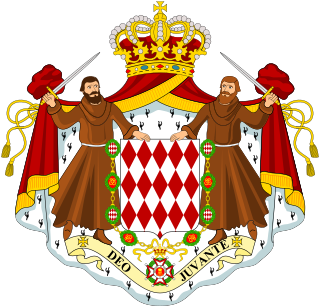
The Principality of Monaco is a sovereign and independent state, linked closely to France by the Treaty of July 1918, which was formally noted in Article 436 of the Treaty of Versailles of 1919. The foreign policy of Monaco is one illustration of this accord: France has agreed to defend the independence and sovereignty of Monaco, while the Monegasque Government has agreed to exercise its sovereign rights in conformity with French interests, whilst at the same time maintaining complete independence. Since then, the relations between the sovereign states of France and Monaco have been further defined in the Treaty of 1945 and the Agreement of 1963.
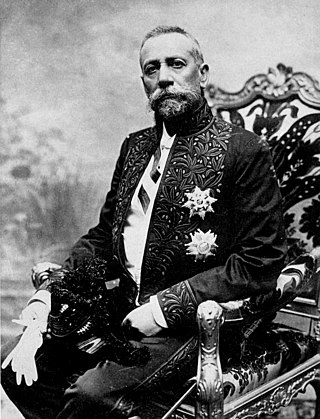
Albert I was Prince of Monaco from 10 September 1889 until his death in 1922. He devoted much of his life to oceanography, exploration and science. Alongside his expeditions, Albert I made reforms on political, economic and social levels, bestowing a constitution on the principality in 1911.

Provence-Alpes-Côte d'Azur, also known as Région Sud, is one of the eighteen administrative regions of France, the far southeastern on the mainland. Its prefecture and largest city is Marseille.
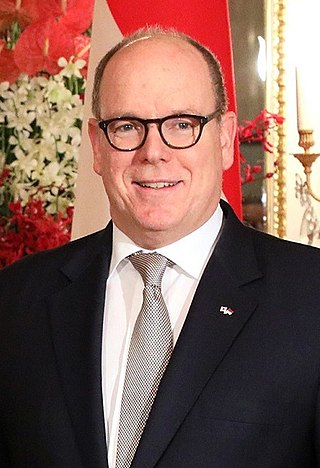
Albert II is Prince of Monaco, reigning since 2005.
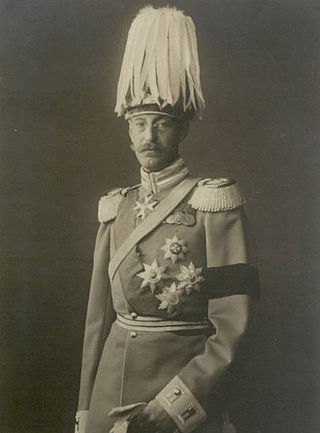
Prince Wilhelm of Urach, Count of Württemberg, 2nd Duke of Urach, was a German prince who was elected in June 1918 as King of Lithuania, with the regnal name of Mindaugas II. He never assumed the crown, however, as German authorities declared the election invalid; the invitation was withdrawn in November 1918. From 17 July 1869 until his death, he was the head of the morganatic Urach branch of the House of Württemberg.
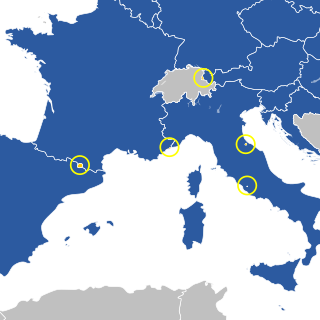
Currently, all of the European microstates have some form of relations with the European Union (EU).
Same-sex unions have been recognised in the microstate of Monaco since 27 June 2020. On 4 December 2019, the National Council passed a bill establishing cohabitation agreements, offering both same-sex and opposite-sex couples limited rights and benefits in the areas of inheritance and property. The law took effect on 27 June.

The Fifth constituency for French residents overseas is one of eleven constituencies each electing one representative of French citizens overseas to the French National Assembly.

General elections were held in Monaco on 19 January 1958. The result was a victory for the National Union of Independents, which won 11 of the 18 seats in the National Council.

General elections were held in Monaco on 25 February and 3 March 1963. The elections were the first since the promulgation of a new constitution implemented after Prince Rainier III relinquished his absolute rule over the principality, and the first in which women were permitted to vote. The result was a victory for the National and Democratic Union, which won 17 of the 18 seats in the National Council.

General elections were held in Monaco on 24 March 1968. The result was a victory for the National and Democratic Union, which won all 18 seats in the National Council.

General elections were held in Monaco on 4 February 1973, with a second round of voting on 11 February. The result was a victory for the National and Democratic Union, which won 16 of the 18 seats in the National Council.
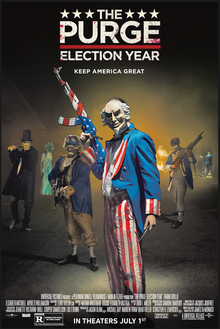
The Purge: Election Year is a 2016 American dystopian political action horror film written and directed by James DeMonaco and starring Frank Grillo, Elizabeth Mitchell, and Mykelti Williamson. It is the sequel to 2014's The Purge: Anarchy and is the third installment in the Purge franchise. Jason Blum and Michael Bay are among the film's producers.

General elections were held in Monaco on 23 April 1911 to elect the 21 members of the National Council. A total of 20 candidates participated in the election. Out of the 629 registered voters, 524 voters cast their ballots.

General elections were held in Monaco on 19 May 1918 to elect the 12 members of the National Council. The national councilmen were elected by a 30-member Electoral College.

General election were held in Monaco on 16 June 1929 to elect the 12 members of the National Council. The national councilmen were elected by a 30-member Electoral College.

General elections were held in Monaco on 16 July 1933 to elect the 12 members of the National Council. The national councilmen were elected by a 30-member Electoral College.

General election were held in Monaco on 21 May 1922 to elect 12 members of the National Council. The national councilmen were elected by a 30-member Electoral College.

General election were held in Monaco on 18 April 1926 to elect 12 members of the National Council. The national councilmen were elected by a 30-member Electoral College.